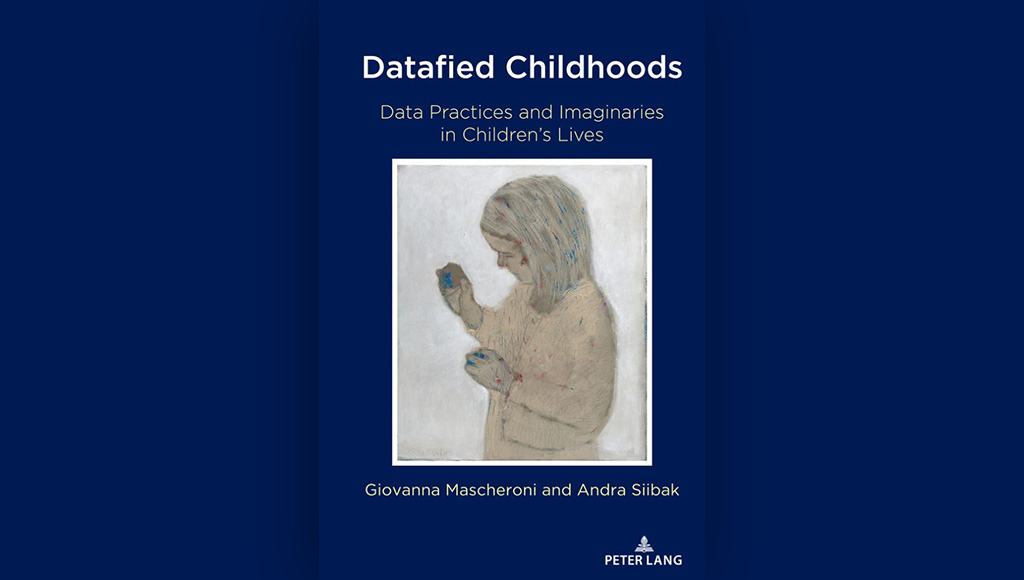Datafied Childhoods: Data Practices and Imaginaries in Children’s Lives from Giovanna Mascheroni and Andra Siibak is dedicated to describing and critiquing practices of datafication that sustain what Shoshana Zuboff calls surveillance capitalism.
Datafication is described as both an outcome and an intensifier of deep mediatization: an outcome, as almost all social action and interaction is now mediatized and generates data traces, but also an accelerator, as algorithmic-based automations increasingly characterize and structure our opportunities for interaction and agency.
Following a social-constructivist perspective within mediatization discourse, Mascheroni and Siibak address the interrelation between changes in media and communication on the one hand, and changes in culture and society on the other, from the viewpoint of human actors.
They describe how Self tracking and forms of caring dataveillance (for example caring for others such as infants through the use of monitoring data-driven technologies) have become viewed as ‘good’ (parenting, caring, health practice), how the idea of placing technology within objects (IoTs) clothing (wearables) and even the body itself is ambivalent (often seen as liberating and empowering, rather than datavillance), but that users do not imagine that data generated through everyday practices would be of any use to anyone, let alone as capital.
To explain how dataveillance has become socially accepted, the authors use Josè van Dijck’s term ‘dataism’, describing it as ‘an emergent epistemological paradigm premised on the extraction of each and every human practice, relation, opinion, and emotion, which is then abstracted into digital data’. The population produces this data through individual use of many forms of technology that are integrated into everyday life (think about smart speakers and health monitoring apps as just two examples), marking a shift from a surveillance state to a surveillance culture.
Throughout the book, the authors offer examples of how data is used for commercial purposes, including mundane examples: from teenage drivers who download an app that monitors their driving habits and are considered safe drivers, thus saving money on their car insurance; to parents resorting to smartspeakers as bedtime storytellers, thus producing a wealth of data about their children .
Building upon this and a host of other examples, the authors consider different uses made from our collected data, arguing that ‘when algorithmic classifications are returned to us in the form of advertisements, suggestions for cultural products, identified gender of friends and acquaintances, or allocative harms, they shape, in turn, our horizons of expectations and practices’. They describe this as a systematic symbolic violation, arguing that data collected by and about children since they are born (or even since gestation) can impact their futures through allocative and representational harms.

when algorithmic classifications are returned to us in the form of advertisements, suggestions for cultural products, identified gender of friends and acquaintances, or allocative harms, they shape, in turn, our horizons of expectations and practices
Beyond discussing the problem of the datafication of everything and datafication as a practice of the self, the book addresses mediatization within parenting, school and education, homes and peer networks. Discussions about the A levels scandal in the UK, the influence of datafication upon democracy and smart speaker use and the Internet Of Things from the perspective of children’s interaction with these technologies all make for rather uncomfortable reading.
Mascheroni followed one of these particular lines of research in her recently published article A New Family Member or Just Another Digital Interface? Smart Speakers in the Lives of Families With Young Children (open access, free to download here), in a 2024 Special Issue of the journal Human Machine Communication.
Based on longitudinal qualitative research involving 20 families with at least one child aged 8 or younger in Italy, the article provides an account of the diverse socially situated practices and contexts in which families adopt, use, and make sense of voice-based home devices with an integrated conversational agent (smart speakers).
Using research designed to investigate the datafication of childhood and family life as a socially situated, everyday and embodied experience, Mascheroni addresses two research questions: To what extent does the family as a communicative figuration change in light of the domestication of smart speakers? And What distinguishes the communicative practices through and with smart speakers from other mediated communicative practices within the family?
Amongst other things, her findings conclude that children under 7 years old often attributed a human-like Human-Machine Communication identity to the conversational agent, which resulted in emotional attachment. Returning to the argument of shaping practices raised in the book, the author finds that human agency is also redefined and constrained: ‘The agency of the users of voice assistants can be best described as the ability to choose among a pre-defined range of interactions that the companies already anticipated for their systems’.
The author describes how communication with smart speakers generates new power dynamics as they acquire a crucial role with respect to the distribution of agency within the family thanks to the datafication and subsequent algorithmic calculation of everyday life.
Both the book and the article are free-flowing and easy to read and we recommend them to all interested.
As our Italian readers might know, the themes addressed are not new to the Bassetti Foundation. In 2022, Veronica Barassi (whose work is regularly cited by Mascheroni and Siibak in both the book and article) presented her book I figli dell’algoritmo. Sorvegliati, tracciati, profilati dalla Nascita (Children of the algorithm. Watched, tracked and profiled from birth), which also addresses the problem of datafication from birth.
Delving further back into the Live-archive, long-time contributor Gabriele Giacomini has published several series of interviews following this theme, including with Marco Delmastro, Director of the economic-statistic service at Agcom (the Italian authority for guarantees within communication) and author of Big Data. Come stanno cambiando il nostro mondo (Big Data and how it is changing our world). Video, podcast and a written summary of the event are available here, alongside access to a host of other interviews.
















